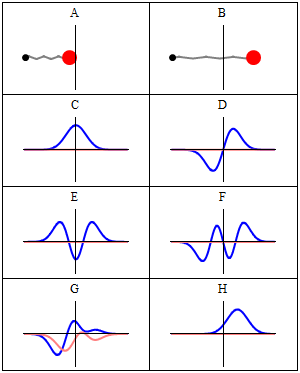File:QuantumHarmonicOscillatorAnimation.gif
QuantumHarmonicOscillatorAnimation.gif (300 × 373 pixels, file size: 759 KB, MIME type: image/gif, looped, 97 frames)
| This is a file from the Wikimedia Commons. The description on its description page there is shown below.
|
Summary
| DescriptionQuantumHarmonicOscillatorAnimation.gif |
English: A harmonic oscillator in classical mechanics (A-B) and quantum mechanics (C-H). In (A-B), a ball, attached to a spring (gray line), oscillates back and forth. In (C-H), wavefunction solutions to the Time-Dependent Schrödinger Equation are shown for the same potential. The horizontal axis is position, the vertical axis is the real part (blue) or imaginary part (red) of the wavefunction. (C,D,E,F) are stationary states (energy eigenstates), which come from solutions to the Time-Independent Schrodinger Equation. (G-H) are non-stationary states, solutions to the Time-Dependent but not Time-Independent Schrödinger Equation. (G) is a randomly-generated superposition of the four states (E-F). H is a "coherent state" ("Glauber state") which somewhat resembles the classical state B.
العربية: مذبذب توافقي في الميكانيكا الكلاسيكية (A-B) وميكانيكا الكم (C-H). في (A-B)، كرة متصلة بنابض (خط رمادي)، تتأرجح ذهابًا وإيابًا. في (C-H)، يعرض حلول الدالة الموجية لمعادلة شرودنغر المعتمدة على الوقت لنفس الإمكانات. المحور الأفقي هو الموضع، والمحور العمودي هو الجزء الحقيقي (الأزرق) أو الجزء التخيلي (الأحمر) من دالة الموجة. (C ،D ،E ،F) هي حالات ثابتة (حالات الطاقة الذاتية)، والتي تأتي من حلول معادلة شرودنغر المستقلة عن الزمن. (G-H) هي حالات غير ثابتة، وهي حلول لمعادلة شرودنغر التي تعتمد على الوقت ولكنها ليست مستقلة عن الوقت. (G) هو تراكب أنشىء عشوائيًا للحالات الأربع (E-F). H هي "حالة متماسكة" ("حالة جلوبر") تشبه إلى حد ما الحالة الكلاسيكية B. |
| Date | |
| Source | Own work |
| Author | Sbyrnes321 |
(* Source code written in Mathematica 6.0 by Steve Byrnes, Feb. 2011. This source code is public domain. *)
(* Shows classical and quantum trajectory animations for a harmonic potential. Assume m=w=hbar=1. *)
ClearAll["Global`*"]
(*** Wavefunctions of the energy eigenstates ***)
psi[n_, x_] := (2^n*n!)^(-1/2)*Pi^(-1/4)*Exp[-x^2/2]*HermiteH[n, x];
energy[n_] := n + 1/2;
psit[n_, x_, t_] := psi[n, x] Exp[-I*energy[n]*t];
(*** A random time-dependent state ***)
SeedRandom[1];
CoefList = Table[Random[]*Exp[2 Pi I Random[]], {n, 0, 4}];
CoefList = CoefList/Norm[CoefList];
Randpsi[x_, t_] := Sum[CoefList[[n + 1]]*psit[n, x, t], {n, 0, 4}];
(*** A coherent state (or "Glauber state") ***)
CoherentState[b_, x_, t_] := Exp[-Abs[b]^2/2] Sum[b^n*(n!)^(-1/2)*psit[n, x, t], {n, 0, 15}];
(*** Make the classical plots...a red ball anchored to the origin by a gray spring. ***)
classical1[t_, max_] := ListPlot[{{max Cos[t], 0}}, PlotStyle -> Directive[Red, AbsolutePointSize[15]]];
zigzag[x_] := Abs[(x + 0.25) - Round[x + 0.25]] - .25;
spring[x_, left_, right_] := (.9 zigzag[3 (x - left)/(right - left)])/(1 + Abs[right - left]);
classical2[t_, max_] := Plot[spring[x, -5, max Cos[t]], {x, -5, max Cos[t]}, PlotStyle -> Directive[Gray, Thick]];
classical3 = ListPlot[{{-5, 0}}, PlotStyle -> Directive[Black, AbsolutePointSize[7]]];
classical[t_, max_, label_] := Show[classical2[t, max], classical1[t, max], classical3,
PlotRange -> {{-5, 5}, {-1, 1}}, Ticks -> None, Axes -> {False, True}, PlotLabel -> label, AxesOrigin -> {0, 0}];
(*** Put all the plots together ***)
SetOptions[Plot, {PlotRange -> {-1, 1}, Ticks -> None, PlotStyle -> {Directive[Thick, Blue], Directive[Thick, Pink]}}];
MakeFrame[t_] := GraphicsGrid[
{{classical[t + 2, 1.5, "A"], classical[t, 3, "B"]},
{Plot[{Re[psit[0, x, t]], Im[psit[0, x, t]]}, {x, -5, 5}, PlotLabel -> "C"],
Plot[{Re[psit[1, x, t]], Im[psit[1, x, t]]}, {x, -5, 5}, PlotLabel -> "D"]},
{Plot[{Re[psit[2, x, t]], Im[psit[2, x, t]]}, {x, -5, 5}, PlotLabel -> "E"],
Plot[{Re[psit[3, x, t]], Im[psit[3, x, t]]}, {x, -5, 5}, PlotLabel -> "F"]},
{Plot[{Re[Randpsi[x, t]], Im[Randpsi[x, t]]}, {x, -5, 5}, PlotLabel -> "G"],
Plot[{Re[CoherentState[1, x, t]], Im[CoherentState[1, x, t]]}, {x, -5, 5}, PlotLabel -> "H"]}
}, Frame -> All, ImageSize -> 300];
output = Table[MakeFrame[t], {t, 0, 4 Pi*96/97, 4 Pi/97}];
SetDirectory["C:\\Users\\Steve\\Desktop"]
Export["test.gif", output]
Licensing
I, the copyright holder of this work, hereby publish it under the following license:
| This file is made available under the Creative Commons CC0 1.0 Universal Public Domain Dedication. | |
| The person who associated a work with this deed has dedicated the work to the public domain by waiving all of their rights to the work worldwide under copyright law, including all related and neighboring rights, to the extent allowed by law. You can copy, modify, distribute and perform the work, even for commercial purposes, all without asking permission.
http://creativecommons.org/publicdomain/zero/1.0/deed.enCC0Creative Commons Zero, Public Domain Dedicationfalsefalse |
Captions
Add a one-line explanation of what this file represents
Items portrayed in this file
depicts
27 February 2011
File history
Click on a date/time to view the file as it appeared at that time.
| Date/Time | Dimensions | User | Comment | |
|---|---|---|---|---|
| current | 02:16, 2 March 2011 | 300 × 373 (759 KB) | Sbyrnes321 | Alter spring, to avoid the visual impression that the ball is rotating in a circle around the y-axis through the third dimension. |
File usage
The following page uses this file:
